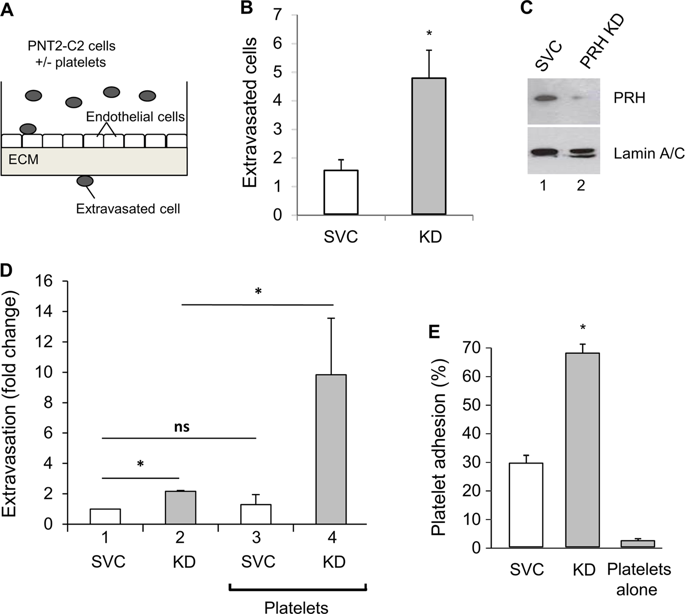当前位置:
X-MOL 学术
›
Oncogenesis
›
论文详情
Our official English website, www.x-mol.net, welcomes your
feedback! (Note: you will need to create a separate account there.)
Blood platelets stimulate cancer extravasation through TGFβ-mediated downregulation of PRH/HHEX.
Oncogenesis ( IF 5.9 ) Pub Date : 2020-02-04 , DOI: 10.1038/s41389-020-0189-0 Eudmar Marcolino 1 , Yusra Hasan Siddiqui 2 , Marion van den Bosch 3 , Alastair W Poole 3 , Padma-Sheela Jayaraman 4 , Kevin Gaston 1
Oncogenesis ( IF 5.9 ) Pub Date : 2020-02-04 , DOI: 10.1038/s41389-020-0189-0 Eudmar Marcolino 1 , Yusra Hasan Siddiqui 2 , Marion van den Bosch 3 , Alastair W Poole 3 , Padma-Sheela Jayaraman 4 , Kevin Gaston 1
Affiliation

|
Cancer cells go through a process known as epithelial-mesenchymal transition (EMT) during which they acquire the ability to migrate and invade extracellular matrix. Some cells also acquire the ability to move across a layer of endothelial cells to enter and exit the bloodstream; intra- and extravasation, respectively. The transcription factor PRH/HHEX (proline-rich homeodomain/haematopoietically expressed homeobox) controls cell proliferation and cell migration/invasion in a range of cell types. Our previous work showed that PRH activity is downregulated in prostate cancer cells owing to increased inhibitory PRH phosphorylation and that this increases cell proliferation and invasion. PRH inhibits migration and invasion by prostate and breast epithelial cells in part by activating the transcription of Endoglin, a transforming growth factor β (TGFβ) co-receptor. Here we show that depletion of PRH in immortalised prostate epithelial cells results in increased extravasation in vitro. We show that blood platelets stimulate extravasation of cells with depleted PRH and that inhibition of TGFβ signalling blocks the effects of platelets on these cells. Moreover, TGFβ induces changes characteristic of EMT including decreased E-Cadherin expression and increased Snail expression. We show that in prostate cells PRH regulates multiple genes involved in EMT and TGFβ signalling. However, both platelets and TGFβ increase PRH phosphorylation. In addition, TGFβ increases binding of its effector pSMAD3 to the PRH/HHEX promoter and downregulates PRH protein and mRNA levels. Thus, TGFβ signalling downregulates PRH activity by multiple mechanisms and induces an EMT that facilitates extravasation and sensitises cells to TGFβ.
中文翻译:

血小板通过TGFβ介导的PRH / HHEX下调刺激癌症的扩散。
癌细胞经历称为上皮-间充质转化(EMT)的过程,在此过程中,癌细胞具有迁移和侵袭细胞外基质的能力。一些细胞还具有跨过内皮细胞层进入和流出血液的能力。内渗和外渗。转录因子PRH / HHEX(富含脯氨酸的同源域/造血表达的同源异型盒)控制多种细胞类型中的细胞增殖和细胞迁移/侵袭。我们以前的工作表明,由于抑制性PRH磷酸化的增加,前列腺癌细胞中的PRH活性被下调,这增加了细胞的增殖和侵袭。PRH通过激活Endoglin的转录来部分抑制前列腺和乳腺上皮细胞的迁移和侵袭,转化生长因子β(TGFβ)共同受体。在这里,我们显示永生化的前列腺上皮细胞中PRH的耗竭导致体外外渗增加。我们显示,血小板刺激耗尽的PRH刺激细胞的外渗,而抑制TGFβ信号传导则阻止了血小板对这些细胞的作用。此外,TGFβ诱导EMT的特征改变,包括E-钙黏着蛋白表达降低和Snail表达升高。我们显示在前列腺细胞中PRH调节参与EMT和TGFβ信号传导的多个基因。然而,血小板和TGFβ均增加PRH的磷酸化。另外,TGFβ增加了其效应子pSMAD3与PRH / HHEX启动子的结合,并下调了PRH蛋白和mRNA水平。从而,
更新日期:2020-02-04
中文翻译:

血小板通过TGFβ介导的PRH / HHEX下调刺激癌症的扩散。
癌细胞经历称为上皮-间充质转化(EMT)的过程,在此过程中,癌细胞具有迁移和侵袭细胞外基质的能力。一些细胞还具有跨过内皮细胞层进入和流出血液的能力。内渗和外渗。转录因子PRH / HHEX(富含脯氨酸的同源域/造血表达的同源异型盒)控制多种细胞类型中的细胞增殖和细胞迁移/侵袭。我们以前的工作表明,由于抑制性PRH磷酸化的增加,前列腺癌细胞中的PRH活性被下调,这增加了细胞的增殖和侵袭。PRH通过激活Endoglin的转录来部分抑制前列腺和乳腺上皮细胞的迁移和侵袭,转化生长因子β(TGFβ)共同受体。在这里,我们显示永生化的前列腺上皮细胞中PRH的耗竭导致体外外渗增加。我们显示,血小板刺激耗尽的PRH刺激细胞的外渗,而抑制TGFβ信号传导则阻止了血小板对这些细胞的作用。此外,TGFβ诱导EMT的特征改变,包括E-钙黏着蛋白表达降低和Snail表达升高。我们显示在前列腺细胞中PRH调节参与EMT和TGFβ信号传导的多个基因。然而,血小板和TGFβ均增加PRH的磷酸化。另外,TGFβ增加了其效应子pSMAD3与PRH / HHEX启动子的结合,并下调了PRH蛋白和mRNA水平。从而,











































 京公网安备 11010802027423号
京公网安备 11010802027423号